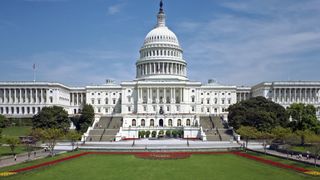Secure Networks Act Passes Senate

The Senate has passed the H.R. 4998, the Secure and Trusted Communications Networks Act of 2019, that body's version of the bipartisan House bill that essentially directs the FCC to do what the FCC has already decided to do: Scrub Huawei and ZTE from USF-funded broadband buildouts. The bill ensure there is money--$1 billion for smaller operators--to compensate suspect tech rippers and replacers.
The House bill passed in December, so it now goes to the President's desk for his signature.
Related: NCTA Points to Suspect Tech Ban's Unintended Consequences
According to the office of Senate Commerce Chairman Roger Wicker (R-Miss.), the bill:
- "Prohibits the Federal Communications Commission (FCC) from subsidizing the acquisition or maintenance of telecommunications equipment or services from untrusted suppliers.
- "Creates a program to reimburse telecommunications providers with fewer than two million customers. These providers will remove equipment that poses a national security risk from their networks to replace it with equipment from trusted suppliers.
- "Establishes an information sharing program for telecommunications providers, particularly small and rural operators, to obtain information regarding potential security risks and vulnerabilities to their networks."
- “Telecommunications equipment from certain foreign adversaries poses a significant threat to our national security, economic prosperity, and the future of U.S. leadership in advanced wireless technology,” Wicker said in a statement. “By establishing a ‘rip and replace’ program, this legislation will provide meaningful safeguards for our communications networks and more secure connections for Americans. I thank my colleagues on both sides of the aisle for coming together to help move this bill to the President’s desk.”
In some sense, the bill is carrying coals to Newcastle. The FCC already voted unanimously back in November to ban suspect tech from networks, come up with a list of suspect tech--led by Huawei and ZTE--and a framework for compensating carriers for ripping and replacing that technology.
In fact, the FCC just this week started collecting input from carriers on just how much of that suspect tech is in their networks to help it come up with that rip and replace framework.
“As our nation becomes more and more reliant on next-generation telecommunication networks, we need to be doing all that we can to make sure that our networks are secure,” said Sen. Mark Warner (D-Va.), ranking member of the Senate Intelligence committee who has pushed for better securing networks against untrusted suppliers. “That includes making sure that we are not allowing our foreign adversaries to infiltrate these networks, and that as a nation, we are not dependent on infrastructure supplied by foreign vendors. This important piece of legislation will help ensure the security of our networks all across the country by making it possible for providers in small and rural communities to rip and replace equipment that might pose a national security risk. I’m very encouraged by this bill’s passage and I look forward to seeing it get signed into law as quickly as possible.”
Multichannel Newsletter
The smarter way to stay on top of the multichannel video marketplace. Sign up below.
“I commend the Senate for passing the Secure and Trusted Communications Networks Act. CCA members care deeply about network security, and this legislation provides much-needed guidance to all carriers, and importantly, resources to replace covered network elements," said Competitive Carriers Association President Steven K. Berry. "This is a significant milestone to address security issues identified by Congress and the Administration. I thank the Senate for its action to send this bill to the President’s desk for enactment, and commend the leadership of Chairman [Frank] Pallone, Chairman [Roger] Wicker, and several other leading members of Congress to advance this important legislation.”
Contributing editor John Eggerton has been an editor and/or writer on media regulation, legislation and policy for over four decades, including covering the FCC, FTC, Congress, the major media trade associations, and the federal courts. In addition to Multichannel News and Broadcasting + Cable, his work has appeared in Radio World, TV Technology, TV Fax, This Week in Consumer Electronics, Variety and the Encyclopedia Britannica.

